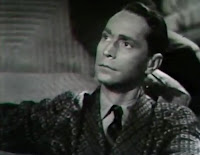I've not watched That Night With You nearly as much as other Franchot films. To be honest, the first time I saw it I thought it was not a strong performance of Franchot's and didn't really go for all the dream sequences. I recently rewatched it and realize I've missed the mark in a lot of ways. Franchot's performance is a bit hammy (the first time I watched it I felt he overplayed it), but it's actually quite in line with the character he plays. As Paul Renoit, he winks and smirks and flirts his way through the picture. But Paul's a self-described cad who promises women stage parts in exchange for romantic interludes, cares only about himself, and thinks he's God's gift to women. The way Franchot plays it absolutely makes sense and is, frankly, a pretty adorable performance. He's lovely to look at and more goofy than debonair throughout the film. I found myself giggling at him by the end of each scene.
Paul's wise-cracking, Eve Arden-type secretary Prudence (Louise Allbritton, a comedic revelation to me) is on to Penny's scheme at once. Paul is, too, but decides to play along. But when his friends begin to joke that Penny really does favor Paul quite a bit in bone structure, Paul begins to worry that he is a father after all. And when his long-forgotten first wife Blossom (Jacqueline de Wit) reappears and vouches for Penny's story, every character becomes confused until the truth finally reveals itself. The film is hard-to-find, but is an engaging, cute story showing Franchot's knack for romantic comedy.
Criticisms:
-Although Franchot is the lead, there are a lot of musical numbers that he's not involved in, so he's not given as much screentime as he could've handled.
-Susanna Foster is lovely and an amazing singer, but I couldn't help but wish Deanna Durbin (her studio-imposed rival at Universal, apparently) was in the role instead. I'm crazy about Durbin-Tone pairings and would've liked to see them in this film together.
-I wish this film had been shot in Technicolor. It would've lent a more magical quality to the dream sequences.
Bosley Crowther (never much of a fan of Franchot's) reviewed the film for the New York Times dated November 9, 1945 and called it a "mild musical" and "romantic nonsense of an innocent and thoroughly foolish sort." He said, "Mr. Tone's coyness as a foster father is not precisely on the scintillating side." I, however, think the innocence and foolishness of the romance is what makes this movie so delightful.














No comments:
Post a Comment